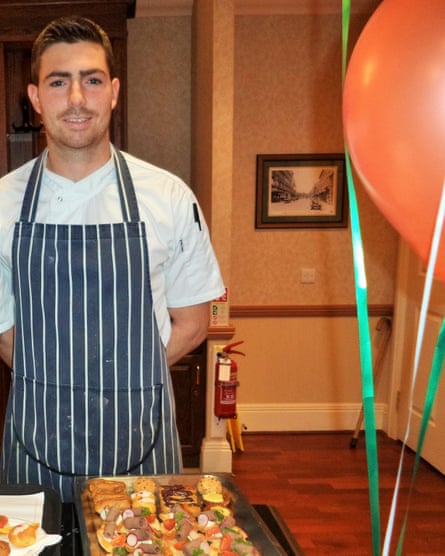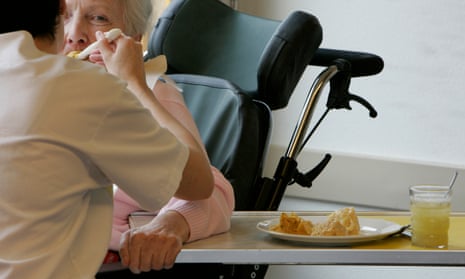Care catering isn’t seen as comparable with Michelin-starred gastronomy nor with the offerings in bars, restaurants and hotels around the country. But thanks to a pioneering new training programme, the face of food in the care industry could soon be given a much-needed makeover.
“People think retirement home food is slop,” says Gareth O’Hara, one of 12 students to complete the pilot course for a new NVQ qualification at north London’s state-of-the-art training facility, Hospitality House. “That honestly couldn’t be further from the truth.”
In his kitchen at Cardiff’s Sunrise residential care home, O’Hara and his team are coming to the end of a busy lunch shift spent creating a three-course meal for 90 residents, each with varying dietary requirements. Dinner is also three courses, as is breakfast, and the kitchen provides a variety of snacks throughout the day and night. But despite the volume of food involved, every plate sent to the dining room is meticulously designed and beautifully presented.

O’Hara came to Sunrise five years ago after cutting his teeth as a chef at a hotel in nearby Bridgend. “I started there as a dish washer, but I enjoyed spending time in the kitchen and was eager to learn more, so they trained me up. I remember feeling really satisfied when I mastered my first dish,” he smiles. “Thai fish cakes with chilli jam.”
O’Hara learned by experience in his first job and it was no different at Sunrise. “In many respects, catering is catering regardless of the industry, but when it comes to care catering there’s a whole world of additional considerations.”
Dysphagia, for example, is a condition that makes it difficult to swallow both solid and liquid food and affects 13.5% of the elderly population. “Even a glass of water can be a huge challenge to some residents,” O’Hara explains. “Food needs to be pureed, but it also has to look attractive and appetising. Nobody wants to eat mush every day.”
Using various technical tricks, and a lot of moulds, O’Hara and his team are able to recreate almost any dish using texture modification. “The residents here are big fans of the fruit dishes we prepare, but sandwiches and even cooked breakfasts can be pureed and then presented as ‘normal’.”
Residents with dementia present another challenge. “There’s a huge amount of science involved here,” says O’Hara. “These residents don’t respond well to normal food or to regular crockery and cutlery, and this is something we have to be very mindful of when creating menus.”
The same goes for residents requiring nutritional fortification, or extra calories, due to reduced appetites or specific illness. “Here you have to find a balance between creating meals that contain the right calories and nutrients, but which aren’t so filling they will put residents off eating for the rest of the day,” says O’Hara. “It’s a challenge.”
The NVQ level 2 diploma in professional cookery in health and social care catering – whose pilot scheme O’Hara completed – was launched in April last year, the result of a collaboration between the National Association of Care Catering (NACC), the Hospital Caterers Association and Barnet and Southgate College.
O’Hara commuted the 160 miles to London and back again, every Monday – his day off – for the 20 weeks of the course, and was named Care Catering Hero at the NACC’s annual awards this year. “If a chef could be cloned, it would be him,” the judges agreed unanimously – and it’s not hard to see why. But what motivates him most is challenging negative images of care catering – coming from both the public and colleagues in the hospitality industry – and increasing the profiles of those who work in the sector.
“I’d like to see care homes accredited in the same way that restaurants are, with rosettes or Michelin stars,” he says. “Chefs in traditional catering environments have to make food look and taste good, but we have a raft of other factors to take into account.” The NACC says care catering has not received the high-profile recognition enjoyed by other sectors of the catering industry and, according to chair Neel Radia, “the care sector itself has not shouted loud enough”. It is hoped that professional accreditation in the form of the new NVQ will provide a platform for talents such as O’Hara to be recognised.
Join the Social Care Network to read more pieces like this. Follow us on Twitter (@GdnSocialCare) and like us on Facebook to keep up with the latest social care news and views.

Comments (…)
Sign in or create your Guardian account to join the discussion